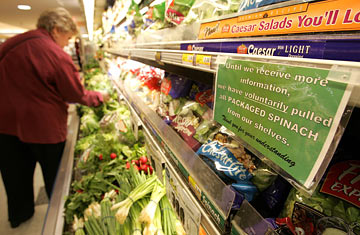
A United Market grocery store alerts customers that all bagged fresh spinach has voluntarily been removed from shelves in San Rafael, Calif.
Every few months, it seems, a new food-contamination scandal grips the nation, playing out in the same troubling way. Someone dies of a food-borne infection with a scary Latin name. The government recalls a dinner-table staple and traces its contamination to dirty irrigation water or a processing plant. Everything returns to normal until the next case of killer spinach or poisoned peanuts stalks the nation.
Despite the toll — 5,000 deaths and 325,000 hospitalizations a year — Congress has typically been unwilling to strengthen controls on the growing, manufacturing and handling of food in the face of powerful industry resistance. But as profits and consumer confidence have plummeted with each new outbreak, the political climate has changed — so much so that earlier this week, a House panel reached unusual bipartisan consensus on the most sweeping reform of the food-safety system in at least 50 years.
The bill gives the Food and Drug Administration (FDA) broad new powers to regulate produce at the farm level and review corporate records on activities ranging from food-processing to pathogen-testing. Inspections that now occur an average of once every 10 years would take place as often as once every six months for certain items. Foreign governments whose companies send high-risk products to the U.S., like seafood from China, would be required to certify that those exports comply with U.S. health standards.
At the center of the legislation is an effort to transform a slow and reactive government apparatus into a preventive food-safety system. Every processor or importer would have to implement plans to identify biological and chemical hazards in its products, like the salmonella discovered at a Georgia peanut plant linked to a national outbreak of the infection in 2008. Firms would be required to maintain strategies and procedures to prevent or stop such dangers. The FDA would set minimum requirements for plans and audit them, a government tool that may have headed off the peanut-borne bacteria that resulted in 700 reported illnesses and nine possible deaths.
"There were no regular inspections of the plant to see if they were meeting standards that FDA hadn't set," says Carol Tucker Foreman of the Consumer Federation of America, which is supporting the bill that, she adds, would fill in those regulatory gaps.
The sudden consensus on food-safety reform isn't necessarily the result of principled legislators standing up to moneyed interests. On the contrary, industry powers like the Grocery Manufacturers Association now support the new oversight, which reflects corporate anxiety over the volatile current system and a recognition that they need a government imprimatur to establish credibility with consumers. Peanut-butter manufacturers, after all, saw sales decline 13% in the wake of the salmonella outbreak, according to the Center for Science in the Public Interest. The spinach industry lost more than $350 million after a wave of E. coli infections linked to California growers was implicated in five deaths.
House Energy and Commerce Committee Republicans who rarely cross party lines went along with the Democratic bill marked up in the health subcommittee Wednesday. Sponsors had agreed in negotiations with ranking GOP member Joe Barton to lower the originally proposed cost of a new annual licensing fee for every food-manufacturing, -processing and -packing plant from $1,000 to $500, with a $175,000 cap per company — a reduction also sought by GOP allies in industry.
Energy and Commerce Committee chairman Henry Waxman calls the fees — which would generate about $160 million — a "critical breakthrough" to finance a newly empowered FDA. But consumer advocates are not happy about the 50% cut. "If FDA doesn't have the money, it's hard for them to do the number of inspections needed," says Foreman.
Waxman will need every vote to achieve his fast-track strategy, which calls for review by the full committee next week and the House before its August recess. The odds of passage there are considered good. Only then will the issue have a chance to get attention in the Senate, where a similar but weaker bill has already been introduced. Unless it gets bogged down by health-care legislation, the Senate is likely to approve some version of food-safety reform. The best assurance of stronger controls is the fear that inaction could lead to inevitable consequences. "What are they going to do," asks Foreman, "if there's another outbreak and they don't pass anything?"
